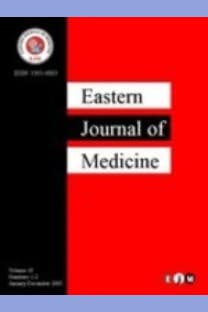Association Between Gestational Weight Gain and Maternal and Neonatal Outcomes
The aim of this study is to assess the effect of gestational weight gain according to initial pregnancy body mass inde x (BMI) on maternal and neonatal outcomes. This is a retrospective cohort study of 937 pregnant women who were followed up and delivered at Zeynep Kamil Maternity and Childrens' Diseases Education and Research Hospital. Subjects were divided into three gro ups according to their weight gain during pregnancy: insufficient (n=249), adequate (n= 302) and excess (n=386). We analyzed maternal characteristics such as maternal age, gravida, parity, body mass index (BMI: kg/m2) initial pregnancy weight, gestational weight gain, and we examined the effect of maternal weight gain on the pregnancy outcome as preeclampsia, preterm premature rupture of membranes (PPROM), preterm delivery, gestational age at delivery, delivery type, indications for cesarean delivery, sex of the infant, 1. ve 5.minute Apgar score, admission to the neonatal intensive care unit (NICU). The mean age of the subjects was 30.04±5.47 years. İnsufficient weight gain was associated with increased risk of PPROM (p<0.05), gestational cholestasis (p<0.05), having infant with low birth weight (LBW) (p<0.01), preterm delivery (<0.01), having infant with smaller than 48 cm lenght (p<0.01), 5. minute apgar score <7 (p<0.01) intrauterine growth retardation (SGA) (p<0.01), and admission to the neonatal intensive care unit (NICU) (p=0.047). In women, excess weight gain was associated with increased rates of macrosomia (p<0.01) and cesarean delivery for the cephalopelvic disproportion compared to women with insufficient and adequate weight gain.( p<0.05). Getting under control of gaining excess weight during pregnancy play an important role in reducing the poor maternal and neonatal outcome.
___
1. Institute of Medicine of the National Academies. Dietary Reference Intakes for energy, carbohydrate, fiber, fat, fattyacids, cholesterol, protein, and amino acids (macronutrients). In: Cutberto Garza (ed). National Academy Press, Washington, D.C. 2005.2. HealthCanada. Nutrition for a Healthy Pregnancy. National Guidelines for the Childbearing Years. Ottawa Minister of Public Works and Government Services Canada.1999.
3. Papachatzi E, Dimitriou G, Dimitropoulos K, Vantarakis A. Prepregnancy obesity: maternal, neonatal and childhood outcomes. J Neonatal Perinatal Med 2013; 6: 203-216.
4. A. Baysal and friends. Determination of nutrition status, Diyet Hand Book (6.press) In: Pekcan G. Ankara Hatiboglu Press 20011; .67- 142.
5. Rasmussen, K.Yaktine, A. Weight gain during pregnancy: reexamining the guidelines. Curr Op in Obstet Gynecol 2009; 21: 521-526.
6. Maulik D. Fetal growth compromise: definitions, standards, and classification. Clin Obstet Gynecol 2006; 49: 214-218.
7. Liu XY, Chen RH. The medicine of children healthcare. Nanjing: Jiangsu Science and Technology Press 2005; 367-368.
8. Slemmons JM, Fagan, RH. A study of the infant's birth weight and mother's gain during pregnancy. Am. J. Obstet. Gynecol 1927; 14: 159.
9. Chesley, LC. Weight changes and water balance in normal and toxic pregnancy. Am. J. Obstet. Gynecol. 1944; 48: 565.
10. Copper RL, DuBard MB, Goldenberg RL, Oweis AI. The relationship of maternal attitude toward weight gain to weight gain during pregnancy and low birth weight. Obstet. Gynecol 1995; 85: 590.
11. Thorsdottir I, Birgisdottir BE. Different weight gain in women of normal weight before pregnancy postpartum weight and birth weight. Obstet. Gynecol 1998; 92: 377.
12. Viswanathan M. Siega-Riz AM. Moos MK. et al. Outcomes of maternal weight gain. Evid Rep Technol Assess 2008; 168: 1-223.
13. Costa BM, Paulinelli RR, Barbosa MA. Association between maternal and fetal weight gain: a cohort study. Sao Paulo Med J 2012; 130: 242-247.
14. Kabiru W, Raynor BD. Obstetric outcomes associated with increase in BMI category during pregnanc. Am J Obstet Gynecol 2004; 191: 928- 932.
15. Johnson JW, Longmate JA, Frentzen B. Excessive maternal weight and pregnancy outcome. Am J ObstetGynecol 1992; 167: 353-370.
16. Cedergren, M. Effects of gestational weight gain and body mass index on obstetric outcome in Sweden. Int J Gynaecol Obstet 2006; 93: 269-274.
17. Dietz P, Callaghan W, Cogswell M. Combined effects of prepregnancy body mass index and weight gain during pregnancy on the risk of preterm delivery. Epidemiology 2006; 17: 170- 177.
18. Stotland, NE., Hopkins, LM., Caughey, AB. Gestational weight gain, macrosomia, and risk of cesarean birth in nondiabetic nulliparas. Obstet Gynecol 2004; 104: 671-677.
19. Shepard, MJ. Hellenbrand, KG., Bracken, MB. Proportional weight gain and complications of pregnancy, labor, and delivery in healthy women of normal prepregnant stature. Am J Obstet Gynecol 1987; 157: 217.
20. DeVader SR, Neeley HL, Myles TD, Leet TL. Evaluation of gestational weight gain guidelines for women with normal prepregnancy body mass index. Obstet Gynecol 2007; 110: 745-751.
21. Edwards LE, Hellerstedt WL, Alton IR, Story M, Himes JH. Pregnancy complications and birth outcomes in obese and normal-weight women: effects of gestational weight change. Obstet Gynecol 1996; 87: 389-394.
22. Chen G, Uryasev S, Young TK. On prediction of thecesareandelivery risk in a largeprivatepractice. Am J Obstet Gynecol 2004; 191: 617-624.
23. Young TK, Woodmansee B. Factors that are associated with, cesarean delivery in a large private practice: the importance of prepregnancy body mass index and weight gain. Am J Obstet Gynecol 2002; 187: 312-318.
24. Thorsdottir I, Torfadottir JE, Birgisdottir BE, Geirsson RT. Weight gain in women of normal weight before pregnancy: complications in pregnancy or delivery and birth outcome. Obstet Gynecol 2002; 99: 799-780.
25. Stotland NE, Cheng YW, Hopkins LM. Gestational weight gain and adverse neonatal outcome among term infants. Obstet Gynecol 2006; 108: 635-643.
- ISSN: 1301-0883
- Başlangıç: 1996
- Yayıncı: ERBİL KARAMAN
Sayıdaki Diğer Makaleler
Dilek AVCİ KUŞASLAN, Ercan ONER
Genetics of premature ovarian failure
Harun Egemen TOLUNAY, Barış BOZA, BULUT VARLI
SERMİN ALGÜL, SEDA UĞRAŞ, MEHMET KARA
Myoinositol causes myometrial contractions in isolated non-pregnant rat myometrium
EBRU ÇELİK KAVAK, EMİNE KAÇAR, SALİH BURÇİN KAVAK, ÖZGÜR BULMUŞ, İHSAN SERHATLIOĞLU, AHMET TEKTEMUR
Ali Haydar AKÇA, MUHAMMED İKBAL ŞAŞMAZ
ABDURRAHMAN AYCAN, İsmail GULSEN, MEHMET ARSLAN, Fetullah KUYUMCU, MEHMET EDİP AKYOL
Anesthesia management in a patient with Situs inversus totalis: Case report
Association Between Gestational Weight Gain and Maternal and Neonatal Outcomes
